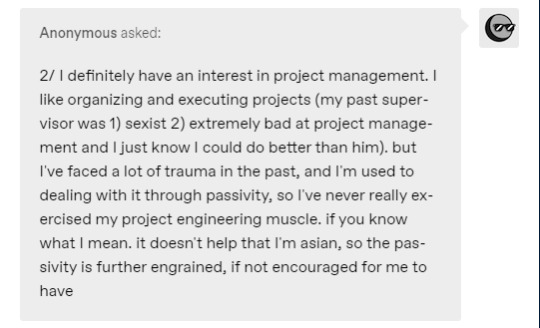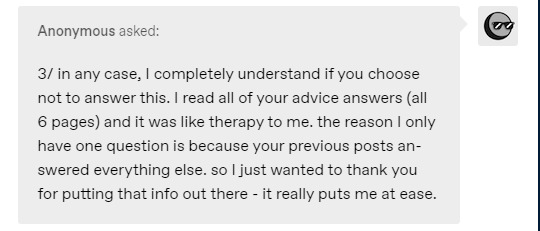#professional advice
Note
Bitches, this isn't strictly finance related, but I have to go on my first business trip at the end of the month and HELP. I've never done a work trip before, any tips?
DON'T 👏 GET 👏 DRUNK 👏
I know that seems like a weird place to start my advice. But I have literally seen people fired, or lose clients over getting too shitfaced at the hotel bar and making a fool of themselves. So if you're going to drink on your business trip, either with coworkers or clients... go easy on the sauce.
Also: remember that a business trip is not a vacation. So make sure you're in work-mode 100% of the time. Don't say or do anything in the presence of others that you wouldn't do in your workplace.
Pack the following:
An extra set of work clothes in case of coffee spills
Bandaids or moleskin patches if your work shoes are high heels or otherwise blister-causing.
Gym clothes and pajamas. Last thing you want is to end your work day and have to lounge around in... a suit.
Your normal shampoo and other products, in travel sizes. I'm allergic to certain shampoos that hotels stock, and let me tell you it is NOT FUN to show up to a big work meeting covered in hives.
SNACKS ON SNACKS. It's hard to seem professional with your tummy growling.
Make sure you have everything work-related you need on your phone if you're traveling without your work computer. And if you're flying, pack all essentials INCLUDING A PROFESSIONAL OUTFIT in your carryon bag.
Whew, that was more than I thought I had to say. Maybe we'll cover this on the podcast this season. But for now, here's some more advice:
What To Wear (and What Not to Wear) To a Job Interview
Season 1, Episode 2: “How Should I Behave on My First Day at Work?”
If you found this helpful, consider joining our Patreon.
66 notes
·
View notes
Note
hello, I hope you're doing well. I was wondering if you could answer a career-related question of mine. I'm a young woman (21) in an extremely male-dominated field. I want to go into project management, but I am not prepared to deal with the insane male egos/fragile masculinity I had to experience during my internships. it doesn't help that I've been a passive person my whole life. how do I overcome my passiveness? how do I even begin to learn leadership and project/people management? 1/


I'm going to be honest, you're catching me at a disadvantage because I'm allergic to project management. Like if I'm sharing an area code with that shit I'm itchy. I'm joking, a little, sort of, because the unfortunate truth is about 50% of my job on any given day at this point is project managements but I still hate it. The point is, I'm not your best point of contact for it, because while I can do it for my specific area of expertise, the practice by itself is not my ministry, if you get my drift. Project managers are lunatics who you will find snorting crushed up Excel spreadsheets in truck stop bathrooms, and for that I fear and respect them.
For the passivity, maybe have some thoughts that might be helpful.
So like, you're probably not going to like hearing this: but oh my God, you're--so young. Like I refer to someone on my team who is 30 this year as the resident fetus. You have nine years before you hit fetus status. So much of you're feeling is only going to be remedied with time and experience, and your fearfulness of speaking or standing out right now in a professional environment isn't a mark of failure in yourself, it's a natural part of your growth and progression.
It is absolutely normal and completely fine that when you were in an intern (or honestly, even early career!) situation, presumably surrounded by people who were more experienced than you and have significant seniority to you, you felt were feeling at sea with the egos and politics.
Here's a dirty little secret, especially re: internships:
Many interns get brought in on projects that are far, far, far beyond their actual scope of capability.
That is because we have no actual expectation that you will deliver any work or usable outputs on it, but we want interns to get excited about what we do, to feel like their work could be important, for them to get a taste of the what it will be like when you actually get your feet wet and have more professional seasoning.
For example, people who summer at law firms get a red carpet experience rolled out to them, and they get to sit in on really exciting high profile client meetings! These are not things that will happen for them again for a long, long, long fucking time once they become associates! Once they've got you in their claws, they no longer care about giving you enjoyable stimulus, now you gotta start billing.
In organizations I've worked at in the past, I was fully happy to welcome interns with like 4 minutes of "experience" into very sensitive high level meetings--with the understanding that (a) everybody there knew they were the intern (b) the objective was to show them what the work could be like and (c) that nobody would actually ask them to throw themselves into the demented fray of the actual work.
The goal isn't to scare you off. We know that the stuff you're seeing a lot of times as an intern is really terrifying, for a lot of reasons. If you're in a room of people with 10 or 20 years of experience on you, then...yeah, it's going to feel awkward. You're not even a full time employee! Of course it's going to be weird and nervewracking! If you didn't feel weird and nervewracked about it, I would ask you to bottle whatever it is you're taking and sell it to become a billionaire.
Beyond that, the rest of it will come with time--truly.
When I think back to the person I was at 21, at 22, I feel such a strange tenderness toward her. I feel so protective. She had no idea what she was doing, and she was doing her best to do her best every day. She failed a lot. She was a mess. The people around her knew it. She knew it. She wasn't the greatest at what she did, or a very good friend, but she was trying so desperately to keep her head above water and only sometimes succeeding.
So much of the vulnerability you're feeling will be remedied in tiny, unnoticed ways. With every day and week and hour, you'll gain some new insight or capability, and some afternoon or month far from today--but closer than you think--you're going to look back and realize you've built yourself an entire suit of professional armor, and have no idea where it came from. You feel passive and ill equipped right now--but that's only because you are ill equipped right now, you just tumbled out onto this strange new world.
It's going to take a while to get your sea legs--just try to be kind to yourself as you do it.
You're going to crush it. I just know it.
83 notes
·
View notes
Text
✨Professional Writing Tips✨
Tired of using italics to convey thoughts? Want to to convey thoughts at the end of a paragraph? Is molding characterization with thoughts too difficult for you? °oO{Try making a thought bubble in your paragraph!}
Using a thought bubble works wonders because it adds a bit of flourish to your writing that it would otherwise be lacking. It makes it incredibly easy to distinguish thoughts from the paragraph, °oO{and is in no way jarring.}
Millions of professional writers use thought bubbles instead of italics, so why not jump on the train and give it a shot?
3 notes
·
View notes
Text
Is Getting A Literary Agent Risky?

You’ve completed your manuscript and you want to publish your book but you don’t know the process. Research is resourceful but it’s not effective if you don’t know what to look for.
There is a plethora of publishing houses to contact and seeing that makes your mind spin. You’ll also see links to literary agents with click baits “we’ll make your book a best seller guaranteed.” You click and you’re engulfed with promises and reviews that you can’t substantiate are legit. The urge to hire an agent is strong because your gut screams that in your hands you hold a book you believe will be a best seller. First time authors tend to see the positive hype of agents promising to make you a best-selling author, but before you decide to hire an agent, you must research further his or her resume to know if they can do what is promised.
Not everything you read is legit. Independent agents are not always truthful with their professional resume. Their website maybe designed sharply with photos of popular books, authors, and testimonies to validate the agent’s expertise. Looks too good to be true, right?
The Association of Literary Agents is a good source to reference for legit agents. They provide names and bios of recommended agents for you to contact if you decide to go that route. Another resource is the Seymour Agency to find an agent that is suitable for your publishing needs. But for independent agents, you can go onto the author’s website to legitimize the agent; also, social media will have authors to advise agents if they used one. Not all independent agents are scammers, but unfortunately, the bad ones make it harder for good agents to obtain work.


Keep in mind that agents will require a contract to hire them. Some require payment upfront and they will all take a percentage of your royalties. All will request to read your manuscript before they decide to work for you, some may even advise you to make changes to make your story impactful to an audience in the genre you’ve written. But if one should ask you to send them your original manuscript, don’t do it. Send them a watermarked copy. There are many horror stories about agents that deceive new authors by taking payments, taking manuscripts and disappearing for an extended period of time - forever. It’s a blow to the gut when you realize that you’ve been duped and your manuscript is forever lost. (Please, always have copies of your story and never, I mean never, send an original.)
If you can afford to hire a literary agent, by all means, do it. If finances have you strapped, know there are more cost effective ways to get your book read, but you just need to apply effort to market yourself. Though the process maybe stressful, it’s a learning experience altogether that helps you grow as an author.
Until next time… happy writing.
Photos: *Raindance Film Festival
#aspiring author#aspiring writer#author#creative writing#female author#female writers#how to write#women writers#writerscommunity#writerscorner#literary agent#Seymour#book publishing#publishing#books#books and reading#new books#creative wrting#write every day#writing advice#writing life#writing#indie author#authors#writer things#creativewriters#aspiring novelist#novice writer#advice#professional advice
3 notes
·
View notes
Text
I mean this as gently as humanly possible, but some of you really need to start interacting with people you don’t like in person. I cannot stress enough that you will be EXPECTED to be able to work alongside or with people you don’t like throughout your life and, in real life, you can’t just clap back with a spicy comment and keep your job.
I am by no means saying you have to tolerate racists, ableists, homophobes, or sexists. But you will have to learn to work with people who you disagree with, whose personalities drive you up the wall, and who you just simply don’t like.
Being unable to do so is a “you” problem that you need to work on- because it doesn’t just apply professionally. It applies when fighting for human rights too. And if you can’t have empathy for the 80 year old who calls your call center because she can’t figure out the online portal, then you’re not really practicing the ~uwu im a small baby that needs empathy~ vibes that you preach, now are you? Treat otters the way you want to be treated, etc etc.
#professional advice#your poor customers and clients and coworkers arent the ones to be mad at my dears#direct that anger straight at the throat of your management#patience and empathy are genuine virtues that need to worked at and practiced#and girlies it WILL help your mental health#not getting on tumblr and being an asshole about your poor fucking elderly clients will HELP you not hate your life#dont know how you can rage about people over 60 and think youre in the right but okay#REGARDLESS if you expect people to accomodate you you also need to be accomodating#and people WILL REWARD YOU for that you have no idea#ive spent so much time calling call center supervisors simply because the person who helped me was so kind i wanted their bosses to know
4 notes
·
View notes
Text
Lawyer: I said I'd talk to [Dad] by which I meant 'have him call you so he can SAY THE SAME THING'. I don't know what it is but when I say stuff it doesn't sink in
Me: He is old. People listen to old white men.
Him: I guess
Me: He also yells?
Him: I could be louder. . .
Me: Pretend to be deaf--oh, get some ear plugs so you ARE a bit deaf and just YELL all the time
Him: OOOOH
5 notes
·
View notes
Link
#trans advice column#trans advice#transgender advice#trans#transgender#queer#lgbtq+#coming out#coming out at work#professional advice
3 notes
·
View notes
Text
Anger is a universal emotion, a natural response to various life situations. However, for some, managing anger can be a challenging task that impacts personal relationships and overall well-being. At Restorative Behavioral Health, Inc., we understand the significance of addressing anger management issues to promote mental and emotional wellness.
0 notes
Text
Embarking on a journey of mental health treatment can be both liberating and overwhelming. For those navigating the intricate landscape of psychiatric medications, it is crucial to grasp the dos and don’ts to ensure a smoother path toward recovery.
0 notes
Text
Corrosion poses a significant threat to the integrity and longevity of firearms and other supplies. Safeguarding your investments against corrosion is essential for maintaining their value, performance, and aesthetics. As a gun shop in Las Vegas, NV, allow us to share some proactive measures to protect your beloved firearms against rust.
0 notes
Text
Making a home comfortable, safe, and accessible is a priority when it comes to our older relatives and friends. As we age, our need for a house layout that favors convenience and security becomes more pressing. It’s an insight gained through our hands-on experience providing home healthcare in Annandale, Virginia.
0 notes
Text
Aging in place is a desire shared by many seniors who wish to maintain their independence and remain in the comfort of their own homes as they grow older. Fortunately, there are various assistance programs available to support this goal. These programs aim to provide seniors with the necessary support and resources to help them continue living independently for as long as possible.
0 notes
Note
can you please share with us more about your experiences relating to your response to the post “if you wouldn’t go to someone for advice, don’t take their criticism either” ?
(asking for a friend who’s struggling at work re: wanting validation and receiving criticism instead)
Unfortunately, very different situation for me. I had a work colleague-semi-mentor who I'd known for a long time, so it took a long time before I could really reconcile that their behavior was completely unacceptable and manipulative. It was a necessary period at the end of an increasingly toxic sentence.
As for your friend re: wanting validation and getting criticism, I do have some generalized insight on that.
One of the most difficult things about a professional career is not having clarity on your performance. Most managers aren't trained on how to manage people, which feels counterintuitive and insane, until you think about how organizations are structured: we usually progress into management after exceling as subject matter experts, which makes sense in some dimensions of work, but is cosmically cursed in so, so many other dimensions of work.
With the caveat that I can only speak to a certain species of Western aligned office for a certain phylum of profit generating organization: something I talk about with a lot of my earlier career employees and colleagues is the deep frustration of feedback, because it's multifaceted.
For a lot of folks it's the frustration and hurt of your manager never providing positive feedback for good work, because the de facto behavior in a lot of workplace environments is that silence is the positive review. It can leave you toiling away without knowing if you did well, or, knowing that you did well and not getting any acknowledgement for it.
This isn't great! A better trained and better prepared manager is as forthcoming with praise and encouragement as they are with constructive feedback. But that's an idealized workplace that doesn't exist in reality, and I think the most important thing to take away from this is that you're not in school anymore, and you can't get your validation from work. Unless you're one of the lucky ones and you work for an organization that's really invested in leadership training, you're likely to have to learn how to cope with this on your own.
You cannot and should not rely on your job for prestige or emotional validation, you shouldn't be looking to build great friendships there, to fall in love there. To be clear: all of these things are possible to gain through work, but none of them are guaranteed or even likely, and no one should expect them. Your job is the thing you do for money, so that you can do other things in life that will validate you emotionally and bring you joy--the job cannot be the thing itself. We all know people whose jobs are their entire personality, and not only is it terminally miserable sitting next to them at dinner parties, it is also not great for the person inflicting it upon you! No job will ever love you back, and you cannot, under any circumstances, let it become the whole of you, or to rely upon it for your sense of worth.
That's a long and intense way of saying: depending on the type of manager and the type of work your friend has, they may never get any validation, and they have to find a way to be okay with that.
But they also need to be honest with themselves, because is it that they're not getting positive feedback when they're delivering great work, or is it the "I turned around this 50 page presentation deck to you in two days and all you did was say that there were typos on four slides" experience?
Given the way you described it in the ask, my guess, and this is a rough one, because there isn't a lot of context here, is that they're doing work they think is good and only getting feedback that focuses on the smaller things that are wrong with it.
Firstly: hell yeah dude that fucking sucks.
Secondly: that said, you did have typos on four slides.
One of the other most significant transitions you make that nobody talks about when you move into the professional sphere is that you're no longer evaluated for effort. That can be a great or terrible thing.
That you spent 100 hours killing yourself to put this project together doesn't really matter if there's something embarrassing and dumb on page 16 that makes your boss look like an idiot in a meeting in front of the clients. As far as they're concerned, you weren't being paid for the 100 hours of effort, you were being paid for delivering something that would make them look smart in that presentation.
By that same token, if you can do that same backbreaking work in 15 minutes with a bunch of Excel macros and fuck around the rest of the day? Who cares--it's getting done, and if it's getting done well, great. Jobs are not forcing you to show your work.
But that doesn't change the sting of how much it sucks when you've worked so hard on something, and at the end of the day, the feedback you get is over something that you perceive to be petty.
Now there are a lot of different influences here: you could have a shitty manager who is just an asshole, you could be working with a fucking weirdo who needed to be shoved into more lockers as a teenager, you could be working for a sociopath--these are all possible.
But what's more likely, from what I have experienced professionally, is that you're likely working for someone who is busy, who hired you to take on something and own it, end to end, and who wants--desperately--to be able to give you work, and never have to think twice about its quality and to trust it absolutely, because it would simplify their life in some way. I'm saying this from personal experience. This is what I want--desperately--from my team, even though I know it is not realistic, and it's almost never possible in a seamless way.
So this is where it's really important that your friend be honest with themselves and evaluate whether those criticisms are--however frustrating--legitimate. Were there issues with the deliverable? Should they have done something different? Should they have communicated better? And if there's smoke there, try to work on gritting your teeth through the knee jerk emotional response and put out the fire, however small, because that's the grit that's going to help propel you through your very long professional career.
It's so, so, so frequently the little things, the rough edges, that feel so unfair to have called out. The typo on page 76. The weird formatting. That one image that uses the wrong hex code for red so it's cool instead of warm tone and that's bugging your leadership team.
But also these small things stand out in the face of an otherwise well-done deliverable. They mar the final work. I'm not saying the weight that they're given is entirely fair--it's not. But don't undercut your own hard work by letting yourself get sloppy as you're dragging across the finish line. You've worked way too fucking hard not to get the credit you deserve for all the work you did to get here. Of course it sucks that this is what anyone is going to notice instead of the broader value, but you can't control that--what you can control is building in time for a last review. Using your network of colleagues to help you give things a proof. Ensuring that you're communicating clearly with your team and manager. Fully take ownership of the stuff you can control, because that's how you're going to get your work taken seriously.
If you can do that, and you can be self-reflective and also detached enough not to let your work performance be an analog for your value, that's going to be an incredible asset as you continue to grow in your career. People say unhinged things to me all the time, and I'm not going to lie and tell you that it doesn't bother me at all anymore, but I'm really good at giving myself the beat, taking five, and then coming back with less immediately murderous reactivity to evaluate things on their actual merits. It means people aren't afraid to be honest with me when there are issues, and it means that I learn about them early enough that I can remediate them and stay a trusted partner and advisor in the workplace.
(And then I go to training and pretend the fucking 20 pound ball filled with sand is my manager and I throw him into walls yelling, "FUCK YOU DUDE," because that anger still has to go somewhere.)
I know it's probably not the answer you or your friend would want to hear, but it's the truth. I try my best to gas up my people by shouting from the rooftops when they do good work, but God knows I also make them crazy when they've spent a long time working on something only for me to tear it to shreds in editing or say, "thanks but this needs another proofing pass," and I'm sure they're plotting my death in bars about it.
60 notes
·
View notes
Text
The food on your plate does more than quench hunger—it can also speed up healing. When you’re dealing with a wound, like those getting wound care in Columbia, Maryland, your body needs more nutrients to power through. So, changing your meals to meet this new demand is kind of like giving your healing a natural boost.
0 notes
Text
Bad Book Reviews, It Happens
You believe your book is great, your friends say it is, and maybe your editor liked your story. You’re now published and you’re on top of the world. You’ve sold a few copies of books; wow. Congratulations. Your hard work paid off. You look at your listing and see a review - hot dog, your first one. Your heart skips beats and then suddenly it sinks because the review is less than favorable leaving you breathless. You explode with anger because that person is an idiot and didn’t appreciate the sacrifices you made and the sleepless nights you suffered during the creation process. Then, you cry because you can’t believe the negative vibe it gives. You call your friends and ask if they bought your book - they haven’t. You question why and feel betrayed because their excuses are offensive. You’re angry because they lied to you about how they enjoyed reading your manuscript and they would buy a copy once it was listed. You feel betrayed because you trusted them.

It happens. It’s not the fault of your friends. Understand that critics can be harsh and it hurts, but you’re in an arena that makes you subject for opinions that may or may not be to your liking. I have acquaintances that quit writing because of unfavorable reviews. They were angry with friends because if they would’ve kept their promise to buy, they could’ve given good reviews. Take a deep breath. Release. You should be proud of yourself. Believe it or not, there are people driven to buy books with unpleasant reviews because they want to see for themselves if a book is truly as awful as commented. You’d be surprised how many counter reviews will soften the harshness of negative comments and that you do have fans of your book. Remember, opinions differ about everything like in certain foods or movies. You’re out there and that matters.

Appreciate that you are published. Having multiple books for sale speaks volume, so, don’t get too wrapped up about certain opinions. Write your heart out and don’t feel bullied from living your dream.
Until next time… happy writing.
Photos: *Getty Images
#aspiring author#aspiring writer#author#creative writing#female author#female writers#how to write#women writers#writerscommunity#writerscorner#book review#book publishing#publishing#publication#public exposure#write every day#writing advice#writing life#writing#creative wrting#creativewriters#indie author#authors#writers and poets#writer things#professional advice#advice#new books#books and reading#books
1 note
·
View note
Text
Caregiving is a noble profession that provides support and care to patients round-the-clock. It can be a rewarding job but draining if you neglect caring for yourself. Respite care is a good option if you need to take a break. When is the right time for respite care?
0 notes